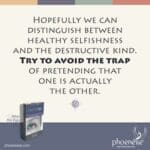

Unhappiness is an indication of sickness. Usually, though, we interpret unhappiness the wrong way, causing us to fight whatever we think is making us unhappy. In our distorted thinking, we think whatever is manifesting is itself the sickness. Yet if we were living completely in harmony with our Real Self and its universal forces, we would not be sick or unhappy. So disharmony and sickness—really any discontentment—are an indicator of our inner health. As we’ll see, there’s also a connection between health and being selfish, which we will get to in a minute.
When we are unhappy, it is our Real Self—our spirit being—that’s talking to us. It’s sending the ego, or outer personality, the message that we should change something. We are going about things the wrong way. This message arises from a desire to return to health, where we will be happy and in a state of well-being.
Being truthful in life is the same as feeling good in the deepest and best possible way, without reservation, and with security and self-liking. If we’re moving through life in a way that is consistent with such a state, our innermost self will be content. So then, any neurosis—any stress, depression, anxiety, obsessive behavior—or unhappiness is a deeper sign that points to the reestablishment of health.
The more free our Real Self is the more clearly such a message will register with the ego. Some may call such an experience, “having a conscience”. For a less developed person, whose Real Self is hidden and crusted over, such signs will register less with them. Such individuals can go for a very long time—perhaps many incarnations—without feeling their inner discontent. Their qualms, anxieties, doubts and pains about how they deviate from the truth at their core don’t make it to the surface. When they violate their own integrity, they don’t register any unhappiness. They might even feel a certain satisfaction at having given in to their destructiveness.
Neurosis then is not a problem. Rather, it’s a signal coming from a healthy spirit that’s rebelling against the person’s mismanagement of their soul. In our confusion, we combat the nonverbal language of the healthy spirit, thinking that’s what is sick. We then try to adjust to an unhealthy life condition, assuming that to rebel against “reality” is to be immature, unrealistic and neurotic.
People who live in such an unrealistic way also tend to flee from self-responsibility. They deny any kind of frustration, and hope to give nothing but get it all. These are the decisions a person has made, and they need to face and change their choices.
Listen and learn more.
Read: Living with Polar Opposites and Finding the Good in Being Selfish


